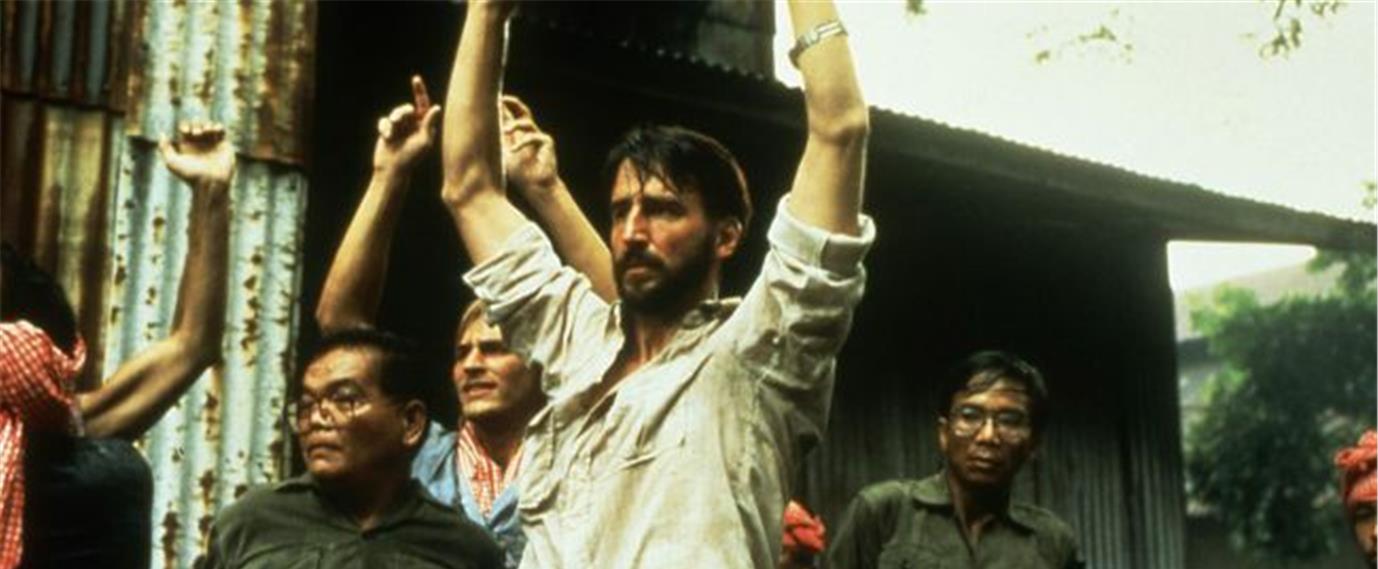في الوقت الذي يستمر فيه الحوار مثارا حول معضلة العلاقة بين الصحفي ومصادره، وتحديدا أولئك الصحفيون الذين يغطون في مناطق النزاع وهم يرافقون الوحدات العسكرية ويتمتعون بحمايتها، أو ما يطلق عليهم صحفيا مصطلح "Embedded Journalist"، وحجم التأثير الذي تحدثه حالة المرافقة تلك على موضوعية الصحفي ودقة المعلومات التي ينشرها؛ يجسّد فيلم "حقول القتل" (The Killing Fields 1984) الذي يعرض قصة صحفي جريدة نيويورك تايمز الأميركية سيدني شانبرج (1934-2016)، و"المخاطرة الكبيرة" التي أخذها على عاتقه في تغطيته في كمبوديا – حسب وصف القائمين على جائزة بوليتزر التي منحوه إياها – للأحداث التي سبقت وتلت استيلاء قوات الخمير الحمر الشيوعية على كمبوديا، وتحديدا العاصمة بنوم بن، والذي يعزز فكرة الموضوعية الكائنة بعيدا عن مرافقة الوحدات العسكرية، وضرورة استقلالية الصحفيين خلال تغطيتهم للصراعات بعيدا عن تأثير أي من أطرافها.
وعمل شانبرغ مراسلا لدى نيويورك تايمز في الفترة بين 1972-1975، وخلال تلك الفترة توجه شانبرغ إلى كمبوديا لتغطية النزاع الدائر هناك بين الحكومة الكمبودية المدعومة أميركيا وقوات الخمير الحمر الشيوعية المدعومة من شمال فيتنام (1968-1975). برز دور شانبرغ في هذه الحرب بتوثيقه للغارات الأميركية على مناطق في كمبوديا أرادت الحكومة الأميركية التستر عليها، إلا أن شانبرغ باستعانته بصحفي محلي يدعى ديث بران، وبالبحث عن مصادر محلية؛ استطاع أن يكشف تلك الهجمات وأن يوثقها في الميدان رغم كل محاولات القوات الأميركية من منعه للمناطق التي وقع عليها القصف الأميركي وتسببت في مقتل مدنيين، بشكل ساهم في ارتفاع أسهم قوات الخمير الحمر شعبيا كبديل للسلطات الرسمية المدعومة أميركيا والتي تسبب سماحها للتدخل الأميركي في كمبوديا إلى مقتل عشرات الآلاف من الكمبوديين بسبب الغارات الأميركية.
الفيلم الذي يوثق لأحداث جرت أثناء وبعد فضيحة ووترغيت التي أطاحت بالرئيس الأميركي ريتشارد نكسون، يوضح في أحداثه علامة تحول مهمة في العلاقة بين المصادر الرسمية والصحفيين، فعلى الرغم من أن الحكومة كانت تتستر رسميا على حجم الضرر الذي سببته تلك الغارات التي تنفذها في كمبوديا، إلى أن مصادر داخل القوات الأميركية هناك سربت عددا من المعلومات إلى شانبرغ تؤكد وقوع مدنيين كضحايا لتلك الغارات.
العلامة الفارقة في هذا الفيلم -الطويل نسبيا-، هو أن شانبرغ لم يكتفِ بتلك التسريبات وقرر الذهاب لتلك المناطق التي وقع عليها القصف الأميركي وتوثيق المشهد على لسان السكان المحليين بمساعدة الصحفي الكمبودي ديث بران الذي كان يؤمن له الترجمة، قبل وصول القوات الأميركية التي يرافقها جوقة من الصحفيين الذين يرون المشهد كما تريد الحكومة الأميركية.
وبعد سقوط السلطة الكمبودية بأيدي قوات الخمير الحمر عام 1975، وانسحاب القوات الأميركية من هناك برفقة أغلب الصحفيين، رفض شانبرغ وعدد قليل من الصحفيين الخروج من العاصمة الكمبودية، وخاطروا بحياتهم من أجل توثيق الأحداث التي تلت استيلاء الخمير الحمر على السلطة، حيث بدأتعمليات التطهير العرقي التي مارسها الخمير الحمر على المواطنين، حيث وثق شانبرغ عملية تهجير أكثر من 4 ملايين كمبودي من منازلهم، لا سيما في الوقت الذي عُزلت فيه العاصمة الكمبودية عن العالم تماما، لكن بقاء شانبرغ في المدينة ساهم في توثيق تلك الأحداث، والتي نشرها في إحدى تقاريرهللنيويورك تايمز في التاسع من آيار/مايو 1975.
ويستمر الفيلم بأحداثه الدرامية التي من الأفضل إبقاءها رهينة المشاهدة الفعلية تجنبا لقتلها. لكن الشاهد في أحداث هذا الفيلم، هو الأهمية الكامنة وراء استقلالية الصحفي خلال تنقله في مناطق النزاعات واستعانته بالمصادر المحلية بدلا من التصريحات الرسمية، وما يؤمنه ذلك من صورة كاملة لمشهد الأحداث بعيدا عن تلاعبات القوى المتنازعة به، من جهة. ومن جهة أخرى الولاء الذي يجب على الصحفي أن يلتزم به تجاه مصادره ومعاونيه وضروة عدم النظر لهم كغنيمة مؤقتة لغايات براغماتية السبق الصحفي.







































